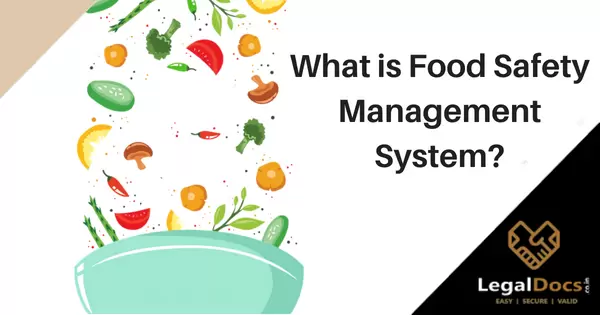What is food safety management system?
The fastest and the biggest growth industry of the recent times is the food industry. With the increased awareness among the consumers, their expectations are also increasing. At the same time, it is the moral duty of the organizations involved in the industry to provide consumer safety and well being. According to Food Safety and Standards Authority of India(FSSAI), the prime body that provides certification for food safety, food safety means adequate control on the presence of food-based hazards in food at the time of its consumption. However, food safety is not a single stage control. Rather, it involves combined efforts of all parties that participate in the food chain and processing. For this matter, cleaning agents, pesticides, fertilizers, veterinary drugs, caterers, food service outlets, transporter, packaging material and feed producers are also involved. The food safety management system is a tool to ensure your food safety at your premises.
The Food Safety and Management Systems is a set of standards established to direct and control food safety aspects. Also referred to as FSMS, it helps the food business operators to gain this trust of the consumers or even serve them efficiently. A food business organization that beholds certification for FSMS depicts assurance that the organization has taken care of appropriate Food Safety and Management System. There are many international organizations like Hazard Analysis and Critical Control Point (HACCP), ISO 22000, Food Safety System Certification; FSSC 22000 that offer FSMS.
Food Safety and Standards Authority of India (FSSAI) is the prime food authority in India. Established by the Ministry of Health and Family Welfare, it is responsible for food safety in India. Established under the Foods Safety and Standards Act (FSSA), 2006, sets science-based standards for the purpose of regulating food products at the time of its production, storage, distribution, sales, and imports. Voluntary certification is provided in accordance with the Food Safety and Standards Act, 2006. This ensures adoption of good manufacturing processes that are hygienic and clean, hazard analysis, and critical control point. The practices are well defined in the regulation. It is therefore mandatory to submit FSMS plan while filing for FSSAI license or its renewal.
Need for Food Safety Management System (FSMS)
Food Safety Management System (FSMS) cannot be separated from food safety. This is because food safety is the prime reason for an FSMS programme. It helps ensure that the food provided by the food business operators is safe for human consumption. Several regulations have been framed by Food Safety and Standards Authority of India (FSSAI) including the FSMS programme that all food business operators must follow.
The International Standard ISO 22003, defines FSMS as a set of interrelated elements that establish policy and objectives. Policies have been extensively used to direct and control the business organization such that the objective of food safety is achieved. For this purpose, many food safety certifications have been established to strengthen the system of providing food safety.
In India, FSMS is a system is a set of systems that are interrelated. This includes procedures and controls laid down by FSSAI. Good manufacturing practices, good hygienic practices, hazard analysis and critical control point are some of them specified under the FSSAI regulations. A combination is used to ensure food safe for human consumption and effective for food businesses to adopt these regulatory procedures.
Food Safety Management System Certification
ISO, FSSC, and HACCP are the prime bodies providing the management system certification schemes. While there are others also available, but there is some difference in their approach. Here are a few features that food safety management system certifications:
Audit approach: Audits usually have a stronger focus on the management effectiveness and commitment. It supports continuous improvements in areas wherever it is possible. FSSC audit is long and is conducted in great depth. It is covered in two stages. The stage 1 audit involves the review of the food safety management system and also takes into account the deep review of HACCP plan.
Focus on food safety: Most organizations who want to integrate quality in their food management systems try to follow the requirements prescribed under the ISO 9001. ISO 22000 provides technical specifications for PRPs covering the food safety. Mostly, all management system standards follow the same format and therefore, the integration of these systems is easy. This means that it is possible to integrate other aspects such as environment through ISO 14001 and corporate responsibility through SA 8000.
Transparency: All information on the food management systems and their certification can be found on their respective websites. This includes the details regarding scheme requirements, decisions taken by the board, names of accelerating bodies, and the certification bodies.
Supply chain approach: The scope of FSC 22000 is limited to manufacturing of food products, food ingredients, food packaging materials, manufacturing of feed, animal production, retail, catering, transport, and storage. In comparison to this, ISO and other supply chain trade organizations are developing their own technical specifications. Further, ISO has also decided to bring in technical specifications for PRPs in each of the food supply chains.
Integrity program: In order to achieve integrity of audits, it is important that all licensed certification bodies meet the FSSC requirements. This is important to ensure confidence in certification. FSSC 22000 has an integrity program that reviews the performance of all contracted certification bodies.
Key elements of ISO 22000:22005 Certification are:
Interactive communication is effective as it is essential to ensure all possible hazards that are duly identified and adequately controlled at each step in the food chain.
The management system must be compatible with the ISO 9001.
Adaptation of ISO 22000:2005 should be a planned decision of any organization. This monitors the critical control point and ascertains corrective actions thereon.
Key elements of HACCP Certification are:
Conducting a hazard analysis.
Prevention of potential hazards by strictly monitoring and controlling of each critical control point of the food production process.
Establishment of critical limits for critical control points.
Establishment of a monitoring system for each critical control point.
Establishment of relevant corrective actions that can be taken.
Establishment of verification procedures.
Establishment of documentation and record keeping.
The company preparing for HACCP system for food safety must comply with the national regulations and codes of practices.
Key elements of FSSC 22000 Certification are:
Based on the existing ISO standards, FSSC 22000 is fully recognized by the Global Food Safety Initiative (GFSI) and many other accreditation bodies all over the world. The European Food and Drink Association (CIAA) and the American Groceries Manufacturing Association (GMA) supports the scheme. It targets specifically the feed and packaging manufacturing sector.
A powerful management systematic framework is provided with the integration of company's overall management system. This is in coordination with the other standards including ISO 9001 and ISO 14001.
A robust hazard analysis is done for better risk management. This helps to improve food safety effectiveness and efficiency.
Technical specifications are used for fitting the retailers need for due diligence and related issues.
The requirement for Food Safety Management System (FSMS) Plan
According to the Food Safety and Standards Act, 2006, all food business operators must have an FSMS plan. A plan is required even if the food business has a food safety certification from HACCP, ISO or FSSC. At the same time, it is easy to prepare FSMS plans for businesses having these certificates. Irrespective of the type and size of the food business, FSMS plan is created. However, the nature of business will decide the complexity of the plan.
Certifications are growing in popularity. Now, a number of large retailers and manufacturers expect their customers to check for this certification before purchasing the product. This will help to prevent illness. Moreover, a standardized system for ensuring integrity and safety of each link involved in the food chain becomes critical when it comes to consumer protection.
Food Safety Management System (FSMS) Documentation
The diagram below shows a brief description of how the documents are to be filed for application of FSSAI license or its renewal:
The first step in the process of seeking FSSAI license or its renewal is to collect the documents. FSMS Program in India shall cover following documents:
The FSMS plan: it is an important document that has details about the steps involved in the operation, the identifiable hazards, methods of its control, the critical limit, methods for monitoring critical threat, corrective actions suggested, responsibility, and record keeping.
Flow chart of the process: it is a representation of the process undertaken by the food business. It provides a proper understanding of the process and the flow of activities.
A self-inspection checklist: An authorized person shall periodically check the points of inspections and mark it as observations and corrective actions can be taken based on the present observations from the checklist. This is based on the FSMS plan. It has to be submitted as an annexure to the plan.
After the documents are organized, guidance may be required by Food Business Operators for preparing the mandatory documents. It is important to note that the documents must be prepared in a prescribed format given in the FSSA rules and regulations.
In order to make the mandatory documents, one may refer to FSSAI guidance documents. These are:
Schedule IV Implementation Guidance and Tools
Conducting a Food Safety Assessment and Developing an FSMS plan.
One may also choose to refer the samples of FSMS documents.
The application is then submitted for approval or renewal, as the case may be.
The documents shall be validated by the respective Food Safety Officer or any other designated officer.
It is commonly argued that petty manufacturers shall be excused from following such sophisticated system. However, it is also true that food safety is independent of type or size of business. The program looks complicated, but the actual documentation depends upon the type of business. Even if a food business operator is not a technical person, a professional help can be taken from any technically qualified person who shall help to implement the requirements on the type of business within 1 to 7 days. This implementation of the program shall ensure the involvement and commitment of the top management.
Are you confident and Motivated enough to Start Food Business in India?
Legaldocs will guide you in getting all necessary Food Licensing and Registration required to start your food business, Please click on the following link to connect with our consultants.
Apply for Food Business Registration Knowledge Center
Knowledge Center


























LEAVE A REPLY: